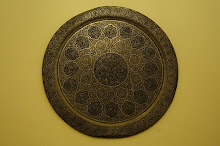"Those who know all, but are lacking in themselves, are utterly lacking."
- Jesus of Nazareth in The Gospel of Thomas
*
In December 1945, a peasant farmer from Upper Egypt named Mohammed Ali Samman made a most unusual discovery.
Digging near some limestone caves, Samman came upon a large earthenware jar. He knew that he had found something out of the ordinary and proceeded to smash the jar open, hoping to find buried treasure. He did indeed find a treasure, but not the sort that he had expected: contained within were some 12 leather-bound papyrus books written in the Coptic language.
This collection of books, which have since been translated, are known today as the Nag Hammadi Library or Nag Hammadi Codices - so named because of the proximity of their discovery to the town of Nag Hammadi in southern Egypt.
The books include fifty-two early Christian treatises that date back to around the 3rd or 4th century AD. The writings themselves are thought to be of an earlier origin.
It is believed that the books may have belonged to a nearby Christian monastery, which hastily buried the texts in order to save them from destruction at the hands of the church, which condemned the use of unsanctioned religious texts in 367 AD.
Among the more interesting and notable of the writings is a text called The Gospel of Thomas. This document is a list of sayings attributed to Jesus.
Stripped of context, and in many instances bordering on the indecipherable, these sayings give a very different impression of the Jesus we know in the New Testament gospels - all of which underwent considerable editing over the ages.
Certainly what comes across in the Gospel of Thomas is a Jesus somewhat removed from the more simplistic and didactic Jesus of the New Testament gospels. And as such it may be that the Gospel of Thomas is a more genuine and accurate representation of the historical Jesus.
The early Gnostics maintain that Jesus was not just a religious pep-talker or teacher of morals, but was a man who had a certain practical knowledge to impart.
The word Gnostic derives from the Greek word gnosis meaning "knowledge" or the "act of knowing.”
The Gnostics held "the conviction that direct, personal and absolute knowledge of the authentic truths of existence is accessible to human beings, and, moreover, that the attainment of such knowledge must always constitute the supreme achievement of human life.”
To the ancient Gnostics, Jesus was part of such a tradition and the Nag Hammadi Codices contain writings that view Christianity in the light of that very tradition.
The Islamic faith, which has its own traditions of Jesus (who Muslims view as a prophet and teacher), depict him similarly.
The Nag Hammadi Codices had a convoluted trajectory, passing through the hands of numerous people including historians, antique dealers, monks, and in the case of one of the books: the Carl Jung Institute in Zurich, before finding their way to the Coptic Museum in Cairo where they are housed today.
The texts were rejected outright by the ruling authorities of Christianity and remain heretical.























